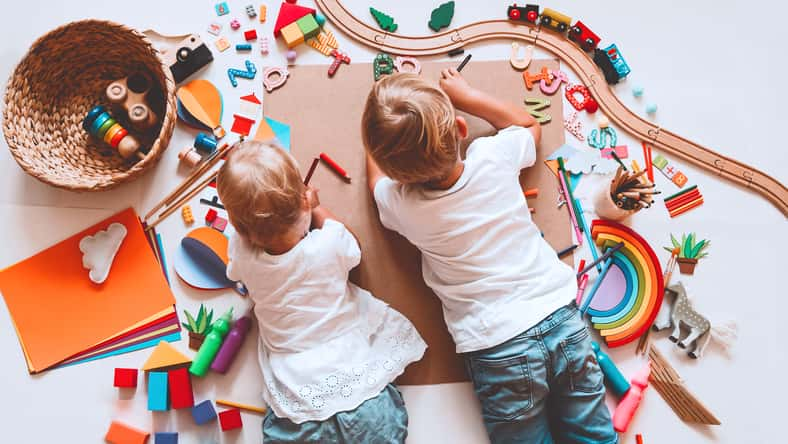Play Is Actually Crucial For A Child’s Development, And Here Are 6 Essential Categories of Play

Play is often regarded as an activity for the sake of entertainment and is not usually seen as something that’s necessary. But in reality, play is actually crucial to children’s development.
Playing is how kids learn new skills and put them to practice. The effects of proper playtime have proven to lead to better academic performance, improved concentration, and a sharper sense of self.
There are also different types of play that children will participate in as they grow. The progression through the stages of play occurs in a linear fashion.
But each child develops at their own pace and may engage in these types of play at different times. Some may even revert to a previous stage, which is completely normal. Here are six essential categories of play that young children take part in.
Unoccupied Play
Unoccupied play is the first stage of play and is practiced by one to three-month-old newborns. It probably won’t look much like play to you, but when your baby is observing their surroundings and making random movements, it’s considered unoccupied play.
Usually, unoccupied play comes naturally to babies, but you can help them explore more. If you feel comfortable doing so, let your baby lie down on a play mat or show them brightly colored objects.
Independent (Solitary) Play
Up until they’re about two-years-old, kids aren’t really interested in playmates and tend to keep to themselves. Playing solo helps them to become self-sufficient.

nataliaderiabina – stock.adobe.com – illustrative purposes only, not the actual children
Provide your child with plenty of toy options, such as stuffed animals, dolls, blocks, musical instruments, and books. Also, even when your child gets older, they still may continue to choose independent play at times, and that’s nothing to worry about–it’s just the preference of some kids.
Onlooker Play
In onlooker play, a child will watch others playing but not participate in the activity themselves. It’s especially common for children between two and three years of age.
By observing other children, kids can learn how to play and gain the confidence to join in on the action if they were feeling a bit tentative before.
Parallel Play
Parallel play is when two toddlers are doing their own thing while sitting next to each other. They’re not exactly playing together because neither toddler is directly influencing how the other is playing.
You don’t need to force your child to interact with another kid. Even though it doesn’t seem like they’re paying much attention to each other, they are. Parallel play teaches important lessons about cooperation and personal space.
Associative Play
Associative play begins at around age three or four. This is when they start to become more interested in what others are doing. They’ll engage with their peers but still primarily play on their own. This stage of play allows little ones to develop a whole host of skills, such as problem-solving, socialization, and language.
Cooperative Play
Cooperative play starts between four and five years of age. It lets them use all the skills your child acquired during other stages of play. Some examples of cooperative play include building a tower together, playing a board game, or an outdoor sport.
Then, from there, your child will branch out toward alternative types of play that fall into the above-mentioned six categories. The other types are dramatic/fantasy play, competitive play, physical play, and constructive play. All of these are beneficial to their growth, and there isn’t one that’s better than the others.
If true crime defines your free time, this is for you: join Chip Chick’s True Crime Tribe
He Secretly Slept With The Wife Of The Guy His Own Wife Had An Affair With Just To Get Revenge
Sign up for Chip Chick’s newsletter and get stories like this delivered to your inbox.
More About:Parenting





